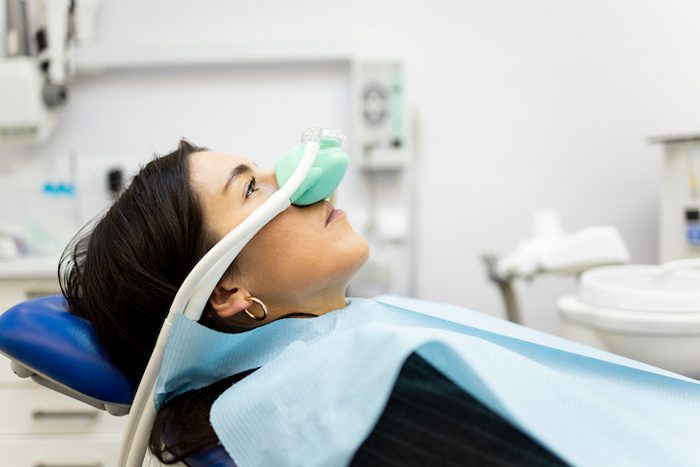Wesley Dental offers sedation dentistry as a general dental service to help patients relax and feel more comfortable during dental procedures. This approach can benefit a wide variety of patients. Sedation dentistry in our Greenville, TX, dental office can make dental visits more pleasant. It also ensures patients get care without undue stress or discomfort.
Dental sedation is a part of general dentistry. It allows our team to provide essential patient care that prevents future dental issues.

Benefits of Sedation Dentistry
Sedation dentistry offers numerous benefits, making dental visits more manageable and less stressful for patients:
Reduces Anxiety and Fear
Many people avoid dental visits due to anxiety or fear of pain. Sedation dentistry helps alleviate these fears, allowing patients to undergo necessary dental treatments without experiencing distress.
Minimizes Discomfort
Sedation can help reduce discomfort during dental procedures. This is valuable for patients with a low pain threshold or sensitive gag reflex. It also makes it easier for the dentist to perform the required treatments.
Allows for More Efficient Dental Work
Dentists can work more efficiently and effectively with the patient relaxed and still. This can reduce the number of visits needed to complete dental work.
Improves Patient Cooperation
Children, individuals with special needs, and those with a hard time sitting still can benefit from sedation. Patients who feel anxious or fearful about visiting the dentist can benefit from this option to help them relax. It helps ensure their cooperation during the procedure. This makes the process smoother for the patient and the dentist.
Enhances Overall Experience
Sedation dentistry enhances the overall dental experience by minimizing pain, anxiety, and discomfort. This encourages patients to maintain regular dental visits and better oral health care. Many patients avoid the dentist because of a fear of pain or judgment.
Ideal Candidates for Sedation Dentistry
Sedation dentistry is suitable for a wide range of patients, particularly those who have:
- Dental Anxiety
- A Low Pain Threshold
- Extensive Dental Work
- Difficulty Sitting Still
- A Strong Gag Reflex
Sedation Dentistry in Greenville, TX
Understanding what to expect during sedation dentistry can help reduce any remaining anxiety and ensure a smooth experience.
Initial Consultation
During your first consultation, our dentist will take the time to thoroughly review your medical history. He will pay attention to any past surgeries, medications, or conditions that could affect your treatment. Our dentist will also carefully assess your dental needs, whether you require a routine cleaning, a more complex procedure, or have issues like dental anxiety.
He will also encourage you to share any concerns or fears about the procedure. Then, he will recommend the right sedation based on this detailed understanding of your health and comfort level.
Administration of Sedation
The method of administering sedation will depend on the type chosen. Inhaled minimal sedation involves wearing a mask, while oral sedation requires taking a pill. IV sedation is administered through a vein, and we provide general anesthesia or deep sedation through IV or inhalation.
Monitoring
During the procedure, we will monitor your vital signs—such as your heart rate, blood pressure, and oxygen levels—for your safety. This allows the dental team to track your body’s response to the sedation and make any necessary adjustments.
Whether your dentist or an anesthesiologist oversees the sedation, they will carefully manage the dosage to maintain your comfort and keep you relaxed. This close monitoring ensures that everything goes smoothly and that you are safe and comfortable from start to finish.
Post-Procedure Care
After the procedure, you will be monitored until the effects of the sedation begin to wear off. Depending on the type of sedation used, you may feel groggy or disoriented for a few hours. Follow your dentist’s post-procedure instructions, which may include:
- Rest: Take it easy for the rest of the day and avoid strenuous activities. You may feel sleepy after treatment and can take a nap.
- Hydration: Drink plenty of water to help flush the sedation drugs from your system.
- Diet: Start with light, easy-to-digest foods and gradually return to your regular diet.
- Pain Management: Follow your dentist’s pain management instructions, such as taking prescribed medications.
Sedation Methods
There are many different types of dental sedation. We’ll work with you to ensure you get the best one for your unique needs.
Inhaled Minimal Sedation
Inhaled minimal sedation, commonly known as laughing gas or nitrous oxide, is one of the most frequently used sedation methods. It involves inhaling nitrous oxide mixed with oxygen through a mask placed over the nose. This method is safe, effective, and wears off quickly, allowing patients to drive themselves home after the procedure.
Oral Sedation
Oral sedation ranges from minimal to moderate, depending on the dose given. Typically, a pill, such as Halcion (a benzodiazepine), is taken about an hour before the procedure. This makes the patient drowsy but still awake.
For moderate sedation, we may administer a larger dose. Patients might fall asleep but can be easily awakened.
IV Moderate Sedation
IV (intravenous) moderate sedation involves administering the sedative drug through a vein, allowing it to work more quickly. The dentist can continuously adjust the level of sedation. This method is particularly useful for longer procedures or patients with higher levels of anxiety.
Deep Sedation and General Anesthesia
We recommend these types of sedation for more complex dental procedures or patients with extreme anxiety or special needs. These methods render the patient nearly or completely unconscious and require a longer recovery time. They are usually administered by an anesthesiologist or a dentist with specialized training.
Sedation Dentistry FAQs
Discover more about sedation dentistry in Greenville, TX, with answers to these patient questions:
Can I drive myself home after I get sedation?
It depends on the type. Yes, you can drive yourself home if you only get laughing gas because it wears off quickly. However, if you get IV or oral conscious sedation, you need a ride to and from our office.
Can children get dental sedation?
Yes, children can get dental sedation, but it depends on their age, health, and the dental procedure. Sedation can help children who are nervous or need a long procedure done. Laughing gas is the most common type of sedation we provide for children. We can safely administer sedation based on your child’s age and weight.
Can I get dental sedation if I have sleep apnea?
Yes, you can get dental sedation if you have sleep apnea, but some types might affect your breathing. Please let us know if you have sleep apnea so we can find the right type of sedation for you. We will choose a method that works best for people with sleep apnea and monitor you closely during the procedure.
Can heart problems impact dental sedation?
Yes, please tell us if you have heart issues before the procedure. Some types of sedation may affect your heart rate or blood pressure, so our dentist will need to choose the safest option for you. They might also ask your doctor for advice or monitor your heart more closely during the procedure. By sharing your health history, our dentist can make sure you stay safe and comfortable.
Can I get sedation for a dental cleaning?
Sedation is usually unnecessary for routine dental cleaning since it’s a simple and quick procedure. However, if you feel very anxious or have trouble sitting still, your dentist may offer light sedation to help you relax. This could be like laughing gas (nitrous oxide), which makes you feel calm but still awake. If you’re nervous about your cleaning, talk to our dentist to see if sedation is a good option.
Is sedation safe?
Yes, sedation is generally safe when done by a trained dentist. Our dentist will choose the right type of sedation for you based on your medical history. They will also monitor you closely during the treatment to make sure you’re safe and comfortable.
Please share your medical history with us before treatment to avoid any risks. When done properly, sedation helps you stay calm and relaxed during dental procedures.
How does sedation dentistry differ from general anesthesia?
Sedation dentistry helps you relax and stay calm. You may feel drowsy but still awake and able to respond to the dentist. Sometimes, you might not even remember the procedure. We offer different levels of sedation, from mild (like laughing gas) to deeper sedation, where you’re very sleepy but not completely unconscious.
General anesthesia makes you completely unconscious. You won’t feel or remember anything during the procedure. It is usually used for major surgeries, not regular dental work, and requires a specialist to monitor you.
Can I eat and drink before dental sedation?
Before dental sedation, our dentist usually asks you not to eat or drink for several hours. This is because having food or liquids in your stomach could cause complications during sedation, like nausea or breathing problems.
For mild sedation, like laughing gas, you might not need to follow strict eating rules, but it’s still good to ask your dentist. For deeper sedation, we will let you know exactly when to stop eating and drinking before your appointment.
Get Comfortable Care
Don’t let dental fear or other issues prevent you from getting the dental care you need. Schedule a consultation to learn more about sedation dentistry in our Greenville, TX, dental office. You can also call 903-455-2942.
